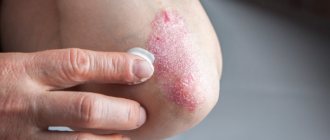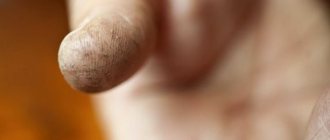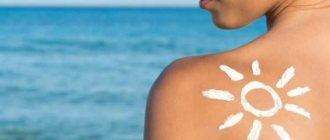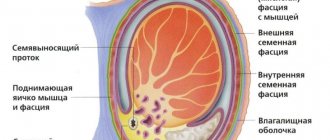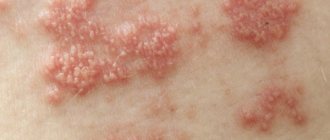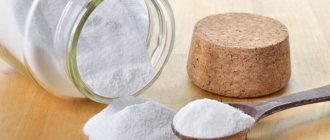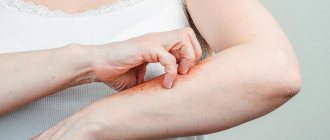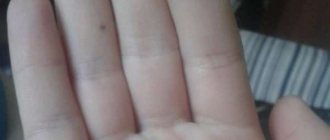Causes of itching
Fingers itch for many reasons. Common ones include:
- Dermatological diseases. This is the most common reason. It is worth carefully examining the skin on your fingers; if there is redness, even slight, there is discomfort from constant drying of your hands and there is a small rash, then it’s time to go see a dermatologist. The most common pathologies that are detected are: urticaria, neurodermatitis, pediculosis.
- Scabies – it is worth highlighting as a separate cause, since this disease is very common. Scabies is caused by a mite that lives on the skin. You can tell that you have scabies on your hands by small, watery pimples; the itching will intensify in the evening. Treatment can only be carried out after an accurate diagnosis has been made. Since the disease is contagious, it is important for all family members to be examined to exclude or confirm their infection. You cannot treat scabies on your own, since most drugs are very dangerous if handled improperly. Home treatment will not give any results at all.
- Allergy. It can be food or contact. Moreover, for contact allergies, the provocateur is not always some kind of aggressive agent; it is often low-quality cosmetics, powders, or dishwashing detergents. Those who suffer from allergies of various kinds need to carefully monitor the condition of their hand skin and moisturize it regularly.
- Eczema is a skin disease that causes inflammation, itching, and flaking of the skin. Eczema can be a complication of allergies. Skin lesions should not be scratched.
- External factors. They can be mechanical, chemical and temperature. Fingers may itch from touching woolen clothing if sweating is blocked or too intense. Overdrying or hypothermia also gives such a reaction. If the skin immediately reacts to such situations, it is called sensitive, and the condition that occurs is called contact dermatitis.
- Fingers may itch due to diseases of the internal organs. Thus, pathologies of the liver and kidneys can provoke itchy skin, because everything in the body is interconnected.
- At the very beginning of the development of diabetes.
- In the presence of tumors and pathologies of the gastrointestinal tract, lymphatic system, thyroid gland.
- Stress and nervous tension. People who have difficulty controlling their emotions may have itchy fingers due to a specific brain response to stress.
- Use of medications. They may have the adverse reaction in question.
- Vegetovascular dystonia.
Folk signs
Hand care
Oddly enough, our ancestors have long noticed a certain connection between itching of the pads and subsequent events. If your fingers itch occasionally, you can check folk signs.
- The pad of your thumb itches, wait for luck.
- The index finger may indicate promotion.
- The middle one hints at financial gain.
- Nameless predicts waste, but quite pleasant ones.
- The little finger brings failure.
Believe it or not, check it out. It’s better to let the pad of your thumb itch for good luck than because of psoriasis or hives. Always keep your hands and personal hygiene products you use clean. Sometimes simply changing your soap or dishwashing detergent is enough.
How to help yourself?
In order not to start a problem, you need to immediately begin to fight it when it is discovered. The manifestation of discomfort can be reduced at home using the following methods:
- Apply an ice compress to the area that itches.
- Boil the oatmeal in 2-3 liters of water, cool to a temperature of 35-37 degrees. You need to put your hands in this solution and hold for 20 minutes.
- Wash your hands often, and use soap that does not dry the skin - baby or laundry soap.
- Carry out hand hygiene and steam in water of normal temperature. Too cold or hot damages the delicate skin of the hands, and it begins to itch.
- To prevent the skin from drying out, it needs to be moisturized with creams, and only high-quality ones should be used, with a normal shelf life.
- You can wipe your hands with alcohol tincture of calendula.
In addition, you need to exclude possible allergens:
- Wash dishes, do laundry, and clean the house only with rubber gloves.
- If this reaction is the result of a cold allergy, then always wear gloves when it gets colder.
- Exclude allergenic foods - salty, spicy, spicy foods, strong tea, coffee, alcohol.
Why do my hands itch?
The causes of itching between the fingers are varied. It occurs due to increased nervousness and anxiety, allergic reactions. Itching as a symptom indicates independent pathologies that require conservative treatment.
To determine the presence of such a sign, it is not necessary to have a medical education. Its presence is determined in accordance with one’s sensations; a desire to scratch appears, which leads to scratching and damage to the skin.
Scabies
Scabies: clinical manifestations of the disease
How to independently determine the causes of itching?
Itching of fingers and toes - an annoying nuisance or a disease? How to get rid of itchy fingers and toes
Itching itself brings a lot of unpleasant sensations to a person, and if we talk about itching of the fingers and toes, the discomfort is felt even more acutely.
Fingers and toes perform a tactile function, and as organs of touch, they are equipped with a large number of receptors (nerve endings). For this reason, itchy fingers are the most painful discomfort.
It is impossible to find a person who has never felt the need to “scratch” an itchy area. In most cases, this is enough to forget about the problem. However, what to do if the itching does not go away even with traumatic scratching, and one single thought has become a splinter in your head: to get rid of such an unpleasant condition?
Despite the apparent simplicity of the problem and its solution, there are a lot of pitfalls in this issue.
What is itchy fingers and toes?
Itching is an uncomfortable sensation that makes it necessary to scratch the affected area of skin. There is no clear medical definition for this physiological condition.
If itching of various areas of the skin can be observed quite often even in a completely healthy person (this is a normal physiological reaction of the body to an irritant, for example, insects, dust, small particles of matter in the air, etc.), then itching of the fingers and toes appears much less frequently . An obsessive discomfort in the area of the fingertips, phalanges, and also between the fingers almost always indicates the presence of one or another dermatological disease.
Causes of itching of fingers and toes
Almost always, the source of painful itching lies in exogenous (external) causes.
Of course, this is not an absolute statement and some diseases can cause itching, but nevertheless, these pathologies almost always provoke generalized (without precise localization) itching.
If we talk about diseases that provoke a specific symptom of itching of the fingers and toes, the list of them will be very modest.
Causes:
1) Thermal irritation. The skin of the fingers contains a huge number of receptors that transmit nerve signals to the spinal cord and brain. Since fingers are the most important part of the touch system, even a small impact can cause a strong “response” from the brain, which will be perceived by a person on a subjective level as an itch.
The higher the intensity of heat exposure, the more severe itching the patient will experience. Therefore, first-degree burns (which are accompanied by slight redness and damage to the surface layer of the skin - the epidermis) are accompanied not so much by pain as by itching.
However, if the deeper layers of the skin are damaged, the itching receptors will be damaged and the intensity of the sensation will drop sharply.
Another good example is first degree frostbite. With minor frostbite of the fingers, capillary stenosis occurs and the temperature of the surrounding tissues decreases due to lack of blood. As soon as the effect of the cold stops, the vessels dilate, blood rushes to the fingers and warms the tissues.
Vasodilation leads to severe irritation of itching receptors. Therefore, almost always after a “walk” in the cold with unprotected hands or in insufficiently warm shoes, the fingers begin to itch unbearably.
2) Mechanical and chemical damage to the epidermis. A similar effect is caused by minor damage to the fingers by aggressive chemicals (for example, household chemicals: bleach, chlorine solution, etc.) or injuries (scratches, abrasions).
3) Psychosomatic factor. Psychosomatic causes and their role in the development of itching of the fingers and toes have not yet been studied. However, the fact that stress, nervous shock, and psychological fatigue can cause unbearable itching of the fingers is undeniable.
4) The use of topical medications, as well as cosmetics. Many ointments and gels can cause discomfort (Fastum gel, Troxevasin, etc.). The same thing occurs when using low-quality cosmetics or products that contain substances that have a high allergenic potential.
5) Allergies. The most common cause of itching of the fingers and toes. A reaction that manifests itself specifically on the skin of the hands or feet can be provoked either by the local use of ointments or cosmetics, or by taking certain products, etc. It all depends on the individual characteristics of the body.
6) Various diseases. This is how diabetes can manifest itself. In diabetes mellitus, the permeability of cell membranes decreases, and most of the synthesized or consumed glucose is not absorbed.
Due to a lack of glucose, lipid, lipoprotein and protein metabolism are disrupted, and therefore metabolism changes significantly. Metabolic changes lead to the extinction of the sebaceous glands. The skin (including the finger area) becomes dry and cracks.
The surface layers of the skin are equipped with a mass of itch receptors. When damaged, these receptors react sharply, sending a signal to the brain. Subjectively, the patient feels it as an itch.
Eczema manifests itself in a similar way . Itching of fingers and toes with eczema can be caused by an infectious skin lesion. But more often, we are talking about allergic etiology.
Infectious diseases , such as streptoderma, etc., contribute to the formation of blisters on the skin (mainly hands and face), causing unbearable itching.
In addition, foci of skin lesions in liver diseases (cirrhosis, failure) are almost always localized in the first stage in the area of the fingers and between the fingers. It is quite obvious that poisoning the body with toxins leads to high intensity itching.
Fungal infections - at the initial stage they manifest themselves as itching. It mainly affects the toes and nails. Often, mycological pathologies cannot be distinguished from allergic eczema or infectious pathology without the help of a specialist.
Scabies are often localized in the area of the palms .
7. Insufficient hygiene of hands and feet. It is necessary to “wash off” dirt, excess sebum and other “waste structures” from the surface of the skin in a timely manner. Particular attention should be paid to the legs, since the lower extremities are in cramped conditions most of the time (this recommendation is especially relevant for patients with excessive sweating of the feet).
Diagnosis of itching of fingers and toes
A discomforting feeling in the area of the fingers is a rather important and informative indicator, signaling a particular pathology. Their number is not so large, therefore, for an experienced dermatologist, making the correct diagnosis is a matter of time and the right diagnostic strategy.
Diagnostic measures include:
- taking anamnesis;
— laboratory tests (complete blood count, skin scraping).
* Anamnesis collection is an oral questioning of the patient during a face-to-face appointment to establish the suspected cause of the disease and the course of the pathological process. The patient's complaints give the doctor the opportunity to establish a primary diagnosis and select the optimal diagnostic strategy.
* Laboratory research.
As a rule, almost all diseases that cause itching of the fingers and toes are accompanied by changes in the blood. In the vast majority of cases, the doctor will have a picture of the inflammatory process of varying intensity (depending on the individual characteristics of the body and the “negligence” of the skin pathology).
A general blood test will show leukocytosis, increased ESR, eosinophilia will indicate an allergy, and the hemoglobin level will tend to exceed the norm. A low concentration of red blood cells indicates an “advanced” inflammatory process. Also, infectious diseases “give” themselves an increased level of platelets.
Blood and urine test for sugar. Allows you to detect diabetes mellitus.
Skin scraping is a relatively easy way to determine the presence of mycological (fungal) and infectious lesions. At the moment, this is the most informative study.
* In some cases, the doctor may resort to dermatoscopy. Despite the fact that this instrumental method has found wide application in oncology and is more often used to detect melanoma at an early stage, it is also suitable for assessing the current condition of the skin and the degree of damage to its structures.
Skin problems related to discomfort in the finger area are complex and varied. The symptom of itching is polyetiological, therefore the range of treating specialists is wide.
If itching of the fingers and toes begins after eating a certain food, contact with a particular substance (dust, animal hair, hair, pollen) or intensifies for the reasons mentioned, one of the types of allergic reactions is most likely occurring.
Treating specialist: allergist, allergist-immunologist.
Itching, which begins after severe psychological shock, stress, nervous tension, has psychosomatic causes.
Treating specialist: neurologist.
There were people in the family suffering from gastrointestinal diseases (mainly liver and gall bladder diseases). The patient has a history of jaundice in childhood or adolescence.
Recently, hepatotoxic drugs have been taken (antibiotics of the latest generation, high-dose antibiotics, calcium channel blockers, drugs for hypertension, etc.).
In this case, there is a risk of developing liver pathologies, including cirrhosis.
Treating specialist: gastroenterologist.
The patient constantly or periodically suffers from thirst. There are uncontrolled “jumps” in weight, spots of unknown origin have appeared on the legs. Bruises often develop on different parts of the body. In this case, we can talk about diabetes mellitus.
Treating specialist: endocrinologist, partly gastroenterologist.
Itching of fingers and toes has an unknown cause. The patient also has no thoughts about the source of the disease.
Treating specialist: dermatologist.
If there are no ideas about the possible source of the pathology, a dermatologist is the first specialist you should visit.
Itching of fingers and toes: treatment
As already mentioned, itching has many causes. Therefore, uniform recommendations for treatment cannot be given. Moreover, itchy skin in the fingers is not a disease. It is not the itching that needs to be treated, but the disease that caused it.
The main and most common cause of itching of fingers and toes is allergies.
To independently relieve the painful discomfort, the best solution is to take antihistamines (Citrine, Suprastin, etc.).
Preference should be given to drugs that have minimal side effects. Their independent example in a small dosage is unable to have any significant negative impact on health.
In more severe cases, do not delay visiting a doctor. Under the supervision of a specialist, therapy with topical hormonal drugs is acceptable.
There is no point in treating fungal infections, as well as infections, on your own. To eliminate the source, complex therapy is required using local antibiotics, anti-inflammatory drugs, hormonal ointments, etc.
If the source of itching is a psychosomatic factor, mild sedatives will help (Novo-Passit, etc.). However, you shouldn’t “overeat” with motherwort, and even more so with valerian. These drugs reduce concentration and depress the emotional centers of the brain, making a person “slow.”
It often happens that the problem lies in insufficient hygiene. In this case, frequent washing of hands and feet will help.
In all other cases, the patient is recommended to visit the attending physician. Under no circumstances should you resort to traditional medicine. If it turns out that the “root of evil” is in the immune reaction, herbs can play a cruel joke and only aggravate the course of the disease. Without special allergy tests, it is impossible to name a list of allergens for a given patient, and therefore it is not worth the risk.
Fungi
If there is redness and itching between your fingers, you may be attacked by fungal diseases. These parasites penetrate the skin and damage it. You will notice redness, flaking, odor, wetness and itching. If treatment is not started immediately, the fungus will spread to the nails and other parts of the body. The dermatologist will prescribe you special ointments and drops, as well as drugs that enhance immunity. During the period when you are infected, you need to actively observe hygiene requirements and avoid high humidity. Physical activity that leads to sweating is also not recommended.
Be sure to complete the entire course of treatment. Even if it seems to you that there are no more signs of fungus, still use the medicine for a few more days. There may still be a small number of parasites left under the skin that will begin to multiply again.
Dermatitis or allergies
Most often, allergies occur through direct contact with allergens of chemical or biological varieties. But dermatitis is a chronic disease that makes itself felt due to poor nutrition, weakened immunity, sudden temperature changes or other conditions.
Such diseases must be combated with the help of antihistamines, which reduce the activity of blood cells that secrete histamine. It is this substance that affects the redness and itching between the fingers. However, if the skin between your fingers itches, do not self-medicate. After all, incorrectly selected drugs will reduce your immunity and cause addiction. This means that other medications and ointments will work much worse.
Scab or scabies
Scabies has plagued humanity for centuries. Fortunately, today such a disease is extremely rare thanks to new technologies and excellent hygiene products. However, the causative agent of the disease has not yet been destroyed. This means that there is a risk of “catching” such an illness. And if it itches between your fingers, how to treat it? This question is asked by many victims of scabies mites. This microscopic creature settles under human skin and “builds” its labyrinths there. It is in these labyrinths that the scabies mite lays its eggs.
The parasite can easily be transmitted throughout the host's body. It is enough to simply move your injured hand over any part of the body. The same can be said about handshakes. Very often this disease spreads among children, because they play outside and very rarely wash their hands. If you notice the slightest sign of scabs, immediately go to a dermatologist. An advanced disease will lead to itching throughout the body and leave unsightly scars.
Pay attention to the symptoms of scabies:
- the skin between the fingers becomes reddish and begins to itch very much;
- damaged areas become wet;
- the skin begins to thicken and peel;
- A rash appears between the fingers and itches.
The doctor will tell you what to treat and what to do in this situation after passing all the tests. Typically, this disease is treated with tablets, ointments and drugs that enhance immunity. The main thing is to follow the rules of hygiene: do not itch and wash your hands with soap.
